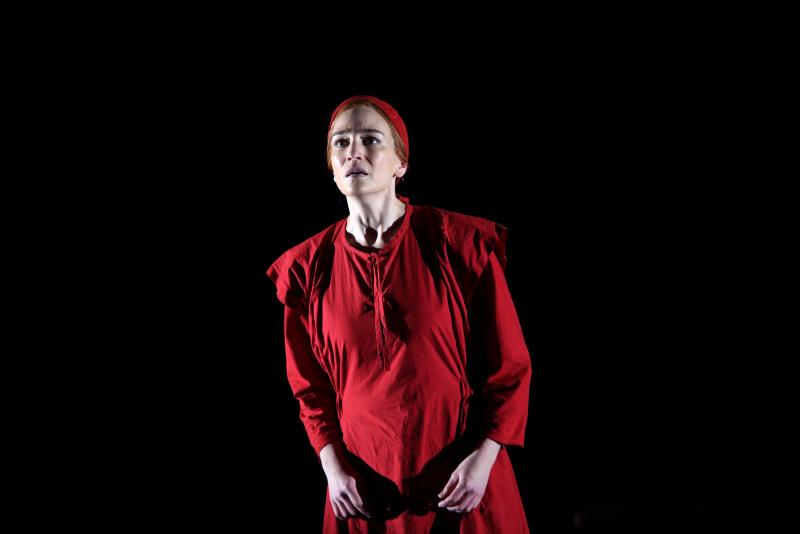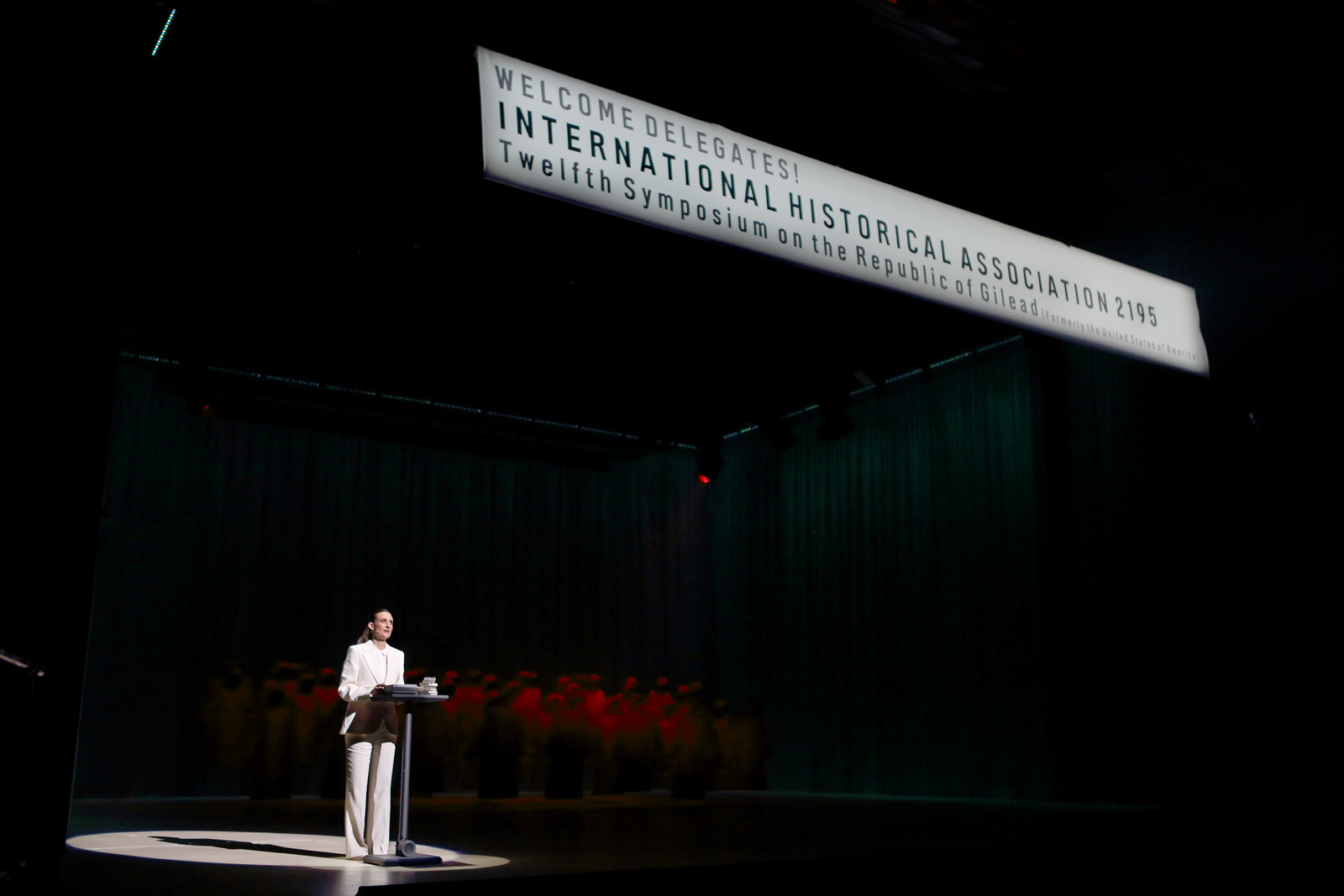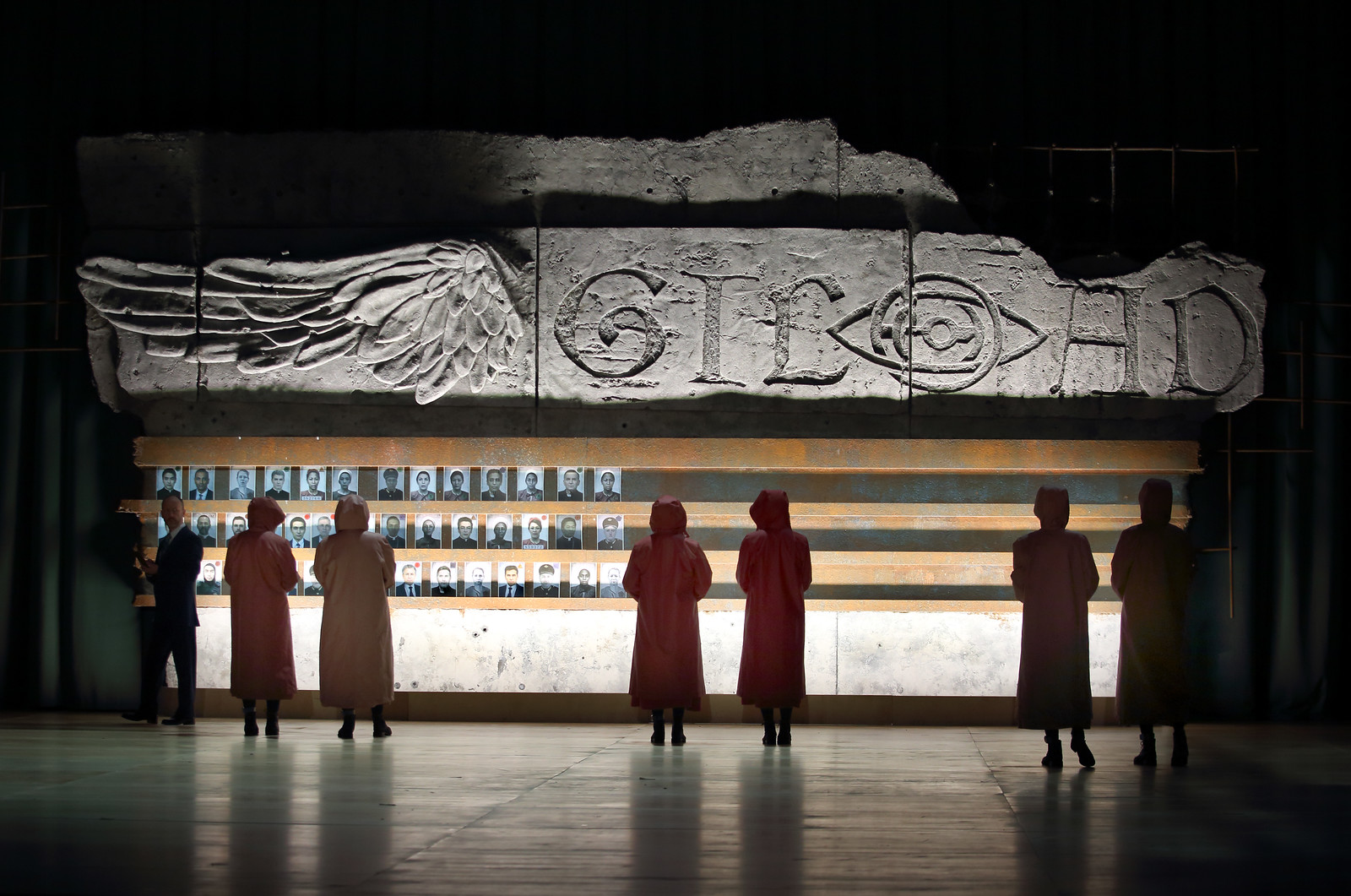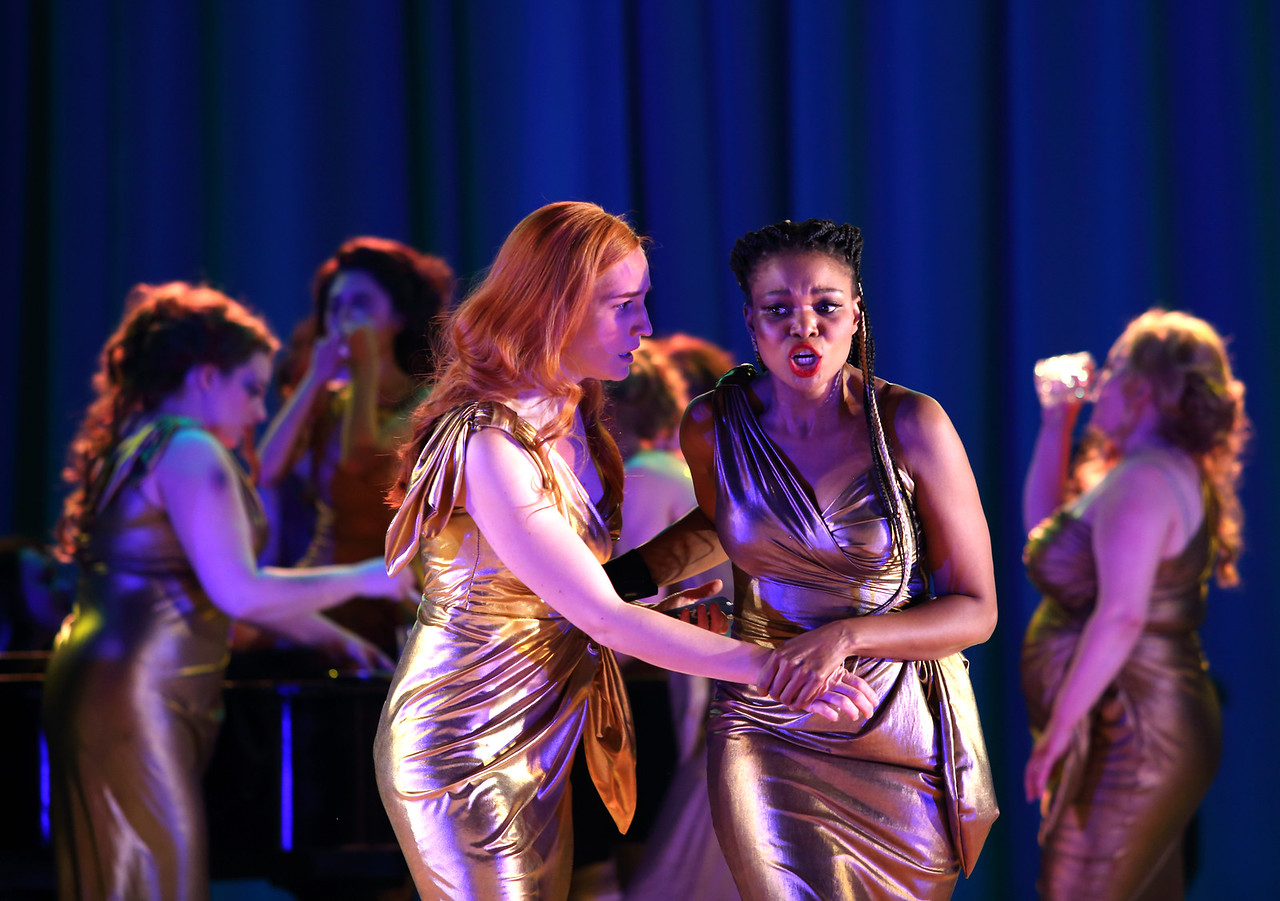The Handmaid's Tale, English National Opera review - a red-hot classic for our times | reviews, news & interviews
The Handmaid's Tale, English National Opera review - a red-hot classic for our times
The Handmaid's Tale, English National Opera review - a red-hot classic for our times
Overwhelming power in Annilese Miskimmon's new production of Poul Ruders's opera

However familiar you are with The Handmaid’s Tale in Margaret Atwood’s novel or its TV adaptation, you might still be knocked sideways by the impact it makes as an opera. Poul Ruders’s music plunges us viscerally into its emotional world, where his ambitious adaptation, premiered in 2000 and first heard in the UK three years later, packs one hell of a punch, its intensity terrifying and relentless.
This opera is also an adept choice for Annilese Miskimmon’s directorial debut at ENO, where she is artistic director. She and her all-female creative team for this new production have produced the best performance I’ve seen there in years.
Ruders has done a certain amount of restructuring and rewriting, and there’s never a moment when his music does not match its dramatic purpose. Chords well up and surge in giant waves of pain, unison female voices sing imposed platitudes in plainchant and minimalist glimmers show the familiar ordinariness of the past; the soundworld is harsh, but never grimmer than Gilead itself. Paul Bentley’s libretto is sharply constructed and treats the novel with fidelity and respect, the one proviso being that there’s a lot of book to fit into two and three-quarter hours and some of the action is inevitably telescoped – some of the smaller roles are very small and we witness what must be the fastest Scrabble game ever played. Still the format makes its demands and it’s hard to imagine it being better done.  But for its framing device of a conference, centuries after Gilead has fallen – a spoken role carried out by the casting coup of the French actress Camille Cottin (pictured above) – the opera, like the book, is seen through the eyes of the handmaid, Offred. It’s a gigantic role, more than merely challenging, and the American mezzo-soprano Kate Lindsey gives what must be the performance of her life, not only coping with everything Ruders asks of her voice, but embodying Offred’s despair, humility, defiance and the spark of passion that stubbornly refuses to let Gilead extinguish it. Miskimmon has her marching purposefully off stage, only to return, seconds later, walking backwards in slow-motion mirror image with her handmaid colleague Ofglen; sometimes Lindsey’s simple turn of the head or glint of the eye conveys all of her pent-up fury and determination.
But for its framing device of a conference, centuries after Gilead has fallen – a spoken role carried out by the casting coup of the French actress Camille Cottin (pictured above) – the opera, like the book, is seen through the eyes of the handmaid, Offred. It’s a gigantic role, more than merely challenging, and the American mezzo-soprano Kate Lindsey gives what must be the performance of her life, not only coping with everything Ruders asks of her voice, but embodying Offred’s despair, humility, defiance and the spark of passion that stubbornly refuses to let Gilead extinguish it. Miskimmon has her marching purposefully off stage, only to return, seconds later, walking backwards in slow-motion mirror image with her handmaid colleague Ofglen; sometimes Lindsey’s simple turn of the head or glint of the eye conveys all of her pent-up fury and determination.
Miskimmon’s staging, though mainly framed by tall curtains on a railing, masterfully mixes stillness, slow-mo, repeated flashbacks to the kidnapping of Offred’s child and rapid-fire action, keeping things pacy and riveting. The set, by Annemarie Woods, goes for utmost simplicity, which is just as well because there is scant time to shunt furniture about. This Gilead scarcely needs elaborate design: it is all in the body language.  The visual horrors of the story – from regular state-sanctioned rape to the grotesque ‘particicution’ where a male prisoner is thrown to a leonine circle of handmaids – are handled with real care for the audience and the performers alike (and there is an ‘intimacy coordinator’). Only very occasionally does this level of caution result in a disconnect in the storytelling: the ‘wall’ that Offred and the handmaids visit is shown as a kind of memorial centre, bearing photographs of the dead, but this seems an oddly tender move for Gilead: in the book the Wall is where bodies of the executed are left hanging as a lesson to others.
The visual horrors of the story – from regular state-sanctioned rape to the grotesque ‘particicution’ where a male prisoner is thrown to a leonine circle of handmaids – are handled with real care for the audience and the performers alike (and there is an ‘intimacy coordinator’). Only very occasionally does this level of caution result in a disconnect in the storytelling: the ‘wall’ that Offred and the handmaids visit is shown as a kind of memorial centre, bearing photographs of the dead, but this seems an oddly tender move for Gilead: in the book the Wall is where bodies of the executed are left hanging as a lesson to others.
The use of video projections, by Akhila Krishnan, is particularly striking, since you are never quite sure whether this is film or behind-the-curtain action. One of the opera’s most original and striking moments is a duet between Offred and her former self in the Time Before; it seems that the former self was pre-recorded by Lindsey, but this could easily be mistaken for live performance.
Lindsey heads a cast that is wholly magnificent, with Emma Bell issuing terrifying power as Aunt Lydia, the handmaids’ controller, in coloratura vocal writing that is ferociously convoluted and unnatural – perfect to convey the perverted logic of her directives. Rhian Lois is heart-rending as Janine/Ofwarren, losing her mind step by step and, after her baby is taken from her, ending up as a loose-haired Ophelia crumbling flowers before being shot.  The radiant-voiced Pumeza Matshikiza is the rebellious Moira (pictured above with Lindsay) – another small role that punches above its weight, but one wishes there was more for her to do– and Susan Bickley delivers a splendid cameo as Offred’s old-world feminist mother. Ofglen, having been a minor character, becomes a major one when her role in the underground resistance catches up with her; Elin Pritchard brings her a touching integrity. A true and fabulous contralto voice is always a special find, and this is very much the case with Avery Amereau as Serena Joy, the Commander’s wife. The few men - Robert Hayward as The Controller, Frederick Ballantyne as Nick, John Findon as Luke and Alan Oke as the lascivious doctor – all make the most of their sporadic appearances. And in the end Offred’ five-year-old daughter and her blue rabbit still manage to steal the show (social media tells us that this adept little actress is the daughter of Rhian Lois).
The radiant-voiced Pumeza Matshikiza is the rebellious Moira (pictured above with Lindsay) – another small role that punches above its weight, but one wishes there was more for her to do– and Susan Bickley delivers a splendid cameo as Offred’s old-world feminist mother. Ofglen, having been a minor character, becomes a major one when her role in the underground resistance catches up with her; Elin Pritchard brings her a touching integrity. A true and fabulous contralto voice is always a special find, and this is very much the case with Avery Amereau as Serena Joy, the Commander’s wife. The few men - Robert Hayward as The Controller, Frederick Ballantyne as Nick, John Findon as Luke and Alan Oke as the lascivious doctor – all make the most of their sporadic appearances. And in the end Offred’ five-year-old daughter and her blue rabbit still manage to steal the show (social media tells us that this adept little actress is the daughter of Rhian Lois).
The tightly written, red-hot musical canvas is magnificently controlled by Joana Carneiro, sparking top-notch orchestral playing. It seems tragic that an already short run of performances has had to lose two of them, after Covid hit. Here’s hoping for a rapid revival. Meanwhile, see it if you can. It's a magnificent and unforgettable achievement.
rating
Explore topics
Share this article
Add comment
The future of Arts Journalism
You can stop theartsdesk.com closing!
We urgently need financing to survive. Our fundraising drive has thus far raised £49,000 but we need to reach £100,000 or we will be forced to close. Please contribute here: https://gofund.me/c3f6033d
And if you can forward this information to anyone who might assist, we’d be grateful.

Subscribe to theartsdesk.com
Thank you for continuing to read our work on theartsdesk.com. For unlimited access to every article in its entirety, including our archive of more than 15,000 pieces, we're asking for £5 per month or £40 per year. We feel it's a very good deal, and hope you do too.
To take a subscription now simply click here.
And if you're looking for that extra gift for a friend or family member, why not treat them to a theartsdesk.com gift subscription?
more Opera
 The Makropulos Case, Royal Opera - pointless feminist complications
Katie Mitchell sucks the strangeness from Janáček’s clash of legalese and eternal life
The Makropulos Case, Royal Opera - pointless feminist complications
Katie Mitchell sucks the strangeness from Janáček’s clash of legalese and eternal life
 First Person: Kerem Hasan on the transformative experience of conducting Jake Heggie's 'Dead Man Walking'
English National Opera's production of a 21st century milestone has been a tough journey
First Person: Kerem Hasan on the transformative experience of conducting Jake Heggie's 'Dead Man Walking'
English National Opera's production of a 21st century milestone has been a tough journey
 Madama Butterfly, Irish National Opera review - visual and vocal wings, earthbound soul
Celine Byrne sings gorgeously but doesn’t round out a great operatic character study
Madama Butterfly, Irish National Opera review - visual and vocal wings, earthbound soul
Celine Byrne sings gorgeously but doesn’t round out a great operatic character study
 theartsdesk at Wexford Festival Opera 2025 - two strong productions, mostly fine casting, and a star is born
Four operas and an outstanding lunchtime recital in two days
theartsdesk at Wexford Festival Opera 2025 - two strong productions, mostly fine casting, and a star is born
Four operas and an outstanding lunchtime recital in two days
 The Railway Children, Glyndebourne review - right train, wrong station
Talent-loaded Mark-Anthony Turnage opera excursion heads down a mistaken track
The Railway Children, Glyndebourne review - right train, wrong station
Talent-loaded Mark-Anthony Turnage opera excursion heads down a mistaken track
 La bohème, Opera North review - still young at 32
Love and separation, ecstasy and heartbreak, in masterfully updated Puccini
La bohème, Opera North review - still young at 32
Love and separation, ecstasy and heartbreak, in masterfully updated Puccini
 Albert Herring, English National Opera review - a great comedy with depths fully realised
Britten’s delight was never made for the Coliseum, but it works on its first outing there
Albert Herring, English National Opera review - a great comedy with depths fully realised
Britten’s delight was never made for the Coliseum, but it works on its first outing there
 Carmen, English National Opera review - not quite dangerous
Hopes for Niamh O’Sullivan only partly fulfilled, though much good singing throughout
Carmen, English National Opera review - not quite dangerous
Hopes for Niamh O’Sullivan only partly fulfilled, though much good singing throughout
 Giustino, Linbury Theatre review - a stylish account of a slight opera
Gods, mortals and monsters do battle in Handel's charming drama
Giustino, Linbury Theatre review - a stylish account of a slight opera
Gods, mortals and monsters do battle in Handel's charming drama
 Susanna, Opera North review - hybrid staging of a Handel oratorio
Dance and signing complement outstanding singing in a story of virtue rewarded
Susanna, Opera North review - hybrid staging of a Handel oratorio
Dance and signing complement outstanding singing in a story of virtue rewarded
 Ariodante, Opéra Garnier, Paris review - a blast of Baroque beauty
A near-perfect night at the opera
Ariodante, Opéra Garnier, Paris review - a blast of Baroque beauty
A near-perfect night at the opera
 Cinderella/La Cenerentola, English National Opera review - the truth behind the tinsel
Appealing performances cut through hyperactive stagecraft
Cinderella/La Cenerentola, English National Opera review - the truth behind the tinsel
Appealing performances cut through hyperactive stagecraft

Comments
Hi... The libretto is by Paul
Corrected this morning! Thank
Corrected this morning! Thank you. JD